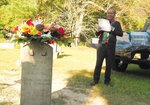




PITTSBORO — On the 100th anniversary of his lynching death, Chatham County paused to remember — and formally memorialize — Eugene Daniel, and honor the county’s Black history, at two separate events on Saturday.
At a soil collection ceremony that morning at New Hope Baptist Church, not far from Jordan Lake, members of the Community Remembrance Coalition-Chatham, descendants of the other children of Eugene’s parents — John and Ida Daniel — and others gathered around Eugene’s gravesite to reflect on his brief life and tragic killing.
CRC-C President Mary Nettles, who also serves as president of the East Chatham Branch of the NAACP, was one of the day’s chief organizers; she and Eugene’s great-niece, Cheryl Taylor, filled two large glass jars with soil which had been removed from the site of Eugene’s lynching. One was presented to representatives of the Equal Justice Initiative and will go on permanent display as part of the EJI’s Community Soil Collection Project in the EJI’s Legacy Museum in Montgomery, Alabama.
The EJI has partnered with community coalitions around the country to memorialize documented victims of racial violence and to promote community dialogue about race and justice. The Community Soil Collection Project gathers soil at lynching sites for display in exhibits bearing victims’ names.
The other jar will remain in Chatham County as part of a display the CRC-C is developing.
Nettles and Taylor, who traveled to Chatham County from her home in New Jersey, also filled smaller jars to present to Daniel descendants — some of whom hadn’t met each other before Saturday — and community members.
About 75 people attended the remembrance ceremony; the morning’s events ended down the road at a libation ceremony in front of the church, during which those attending poured water onto the ground as an offering in memory and tribute to Eugene.
But the day began with a stark reminder of what’s changed in the last century. In remarks at the very start of the morning ceremony, Chatham Sheriff Mike Roberson told the gathered observers that what happened to Daniel — jailed without facing his accuser, abducted illegally from the jail, then lynched — “goes against every fiber of my being.”
“No person should ever go through the terror, fear or injustice of being kidnapped and brutally killed by a vigilante mob,” Roberson said. “No matter what a person may be accused of — and even if they actually committed the accused crime — we all have a constitutional right to due process and equal protection under the law. We have a right to be brought before a jury of our peers for a fair trial, to present a defense and to be treated humanely. Eugene received none of those constitutional protections.”
Eugene, barely a week after his 16th birthday, was accused, and charged, with trespassing and attempted rape after allegedly being seen in the bedroom of Gertrude Stone, who was a year older than him, at her parent’s home on Farrington Road in New Hope Township. She lived not far from Eugene’s own home just a few miles outside of Pittsboro.
After being tracked by bloodhounds and apprehended, Eugene was said to have confessed. He was jailed, but later abducted from the jail by a group of men and taken to a site near the old Moore’s Bridge, where he was hanged. Some of his murderers then opened fire at his body. As he hung, the lynching site was visited by more than 1,000 people, according to contemporary press accounts, before Chatham County’s coroner came to remove the body.
In 2021, Roberson pointed out, the justice system would consider Eugene a juvenile.
“He would be afforded an opportunity to have his charges decided by a system that would not put him to death — a system that might not even leave him with an adult criminal record that could mar his future,” he said. “He may have not been convicted of anything at all.”
Taylor, Eugene’s great-niece, only recently learned about the details of his killing. She said some family members had vague recollections about rumors of the cause of his death, but no one was certain about this history until the planning for Saturday’s remembrance ceremony began to take shape in the last two years.
She said she was “hurt, angry, sad — every emotion came about,” upon discovering Eugene’s lynching — but pleased that Eugene has now been memorialized.
To have soil from the site, and to know the soil will be displayed at the Legacy Museum, has brought members of the Daniel family relief.
“It’s incredible to me,” Taylor said. “He deserves to be a part of this. It means a lot to me.”
Commissioner Karen Howard presided over the libation ceremony which followed at the church, honoring “the spirit of our ancestors who came before us,” she said, as part of a traditional offering in memory of the dead. “Those who arrived in a foreign land on ships and in shackles. Those who went through the trauma of slavery and bore the weight of its ugly inheritance. I honor the ancestors who laid the foundation from which we have grown. Who brought with them traditions, beliefs, practices, fortitude and strength.”
She led those in attendance through a series of recitations paying homage to Eugene and to deceased relatives, calling for a spirit of truth and honesty, and a spirit of forgiveness, love and tenderness, with each recitation concluding with the blessing “ase” — which means “it must happen.”
Howard also announced to the group that county commissioners would consider a resolution on Monday night formally apologizing “for any part an elected official or appointed local official played” in his 1921 murder. The resolution passed unanimously during the board’s meeting (see accompanying story).
The CRC-C’s Nettles said afterward she felt in her heart that Eugene Daniel had been done “a terrible injustice.”
“I wanted to do all I could do to make things better now for his family,” Nettles said. “Eugene Daniel did not have the opportunity to know all that was kept hidden in the Pittsboro community.”
Another organizer, CRC-C member Bob Pearson, said Saturday’s event “marked a sea change in Chatham’s history.”
“There is no turning back,” he said Monday. “The old history of the county is now shelved, and the new history is being written.”
The two events Saturday “put on the public record the most comprehensive story in 250 years of the tragedy and the achievements of the county’s Black citizens as the whole community, white and Black, came together to remember the pain and praise the achievements,” Pearson said. “Truth was heard and acknowledged. The county commissioners officially apologized for the failures of the past county leadership to protect the county’s citizens and condemned the lynchings. Looking ahead, we have the duty of remembrance for the five other lynching victims and the public recognition of those acts for the whole community. We see the clear opportunity to bring justice closer and make reconciliation more likely. That will be our goal in all our work going forward.”
About 50 people attended the “Black History of Chatham County” event Saturday afternoon at the county’s Agriculture & Conference Center. Speakers included Congressman David Price, state Rep. Robert Reives II, Chatham Commissioner Diana Hales, former county commissioner Rev. Dr. Carl Thompson Sr., Sheriff’s Office Chief Deputy Charles Gardner and others.
Siblings Eliot Feenstra and Emily Feenstra, descendants of the Poe family, who were Chatham County slaveholders, came from Oregon and Washington, D.C., respectively. They attended to “bear witness to the truth” of the the role their family may have played in the racial oppression of the time, and vowed “to learn, to listen,” and to commit to having conversations within their surviving family members about “how to repair that wrong.”
Dr. Charles Johnson, an associate professor and the director of public history at North Carolina Central University, shared a presentation — “From Slavery to Freedom: A History of African Americans in Chatham County” — which gave a brief history of the transatlantic slave trade. He said lynching was used as a form of social control and genetic annihilation, particularly the ritualistic, public spectacle lynchings that tended to be common. As a part of his presentation, he traced the history and contributions of a number of families in Chatham County who emerged from slavery to become community leaders.
In addition, a documentary on Eugene’s murder — produced and narrated by Chatham resident Mark Barroso — was shown, delving into possible motives Chatham officials had to murder Eugene.
In his remarks, Thompson, the senior pastor of Word of Life Christian Outreach Center in Siler City, said that any time history is celebrated, we must look at the good and the bad.
“The history of every culture is replete with shining triumphs and horrific tragedies that are scattered through the landscape of time,” he said. “Much of a historical celebration then, must be from a view of where we were and where God has brought us to. In that we can celebrate! The tragedies of history remind us of the power and joy of deliverance.”
He recalled his earliest days seeking elected office in Chatham County, before the water was impounded to fill Jordan Lake.
“I remember during my first campaign covering that entire area and many times I would stop and look out over the vast area of land that would ultimately be covered with miles of water,” he said. “And little did I know then that I was probably traveling in the very spot where that horrendous murder of Eugene Daniel took place 100 years ago.”
He described Eugene as “a symbol, a reminder of the many young people who experienced this unimaginable pain of being taken from their homeland, never to see it again. Brutalized, mutilated, raped and chained. Taken to a land far away and, chained like animals and dehumanized in every way possible. And what we are saying to the descendants of Eugene Daniel, and to all of the Eugene Daniels, from Tulsa, Oklahoma, to Wilmington, N.C, to those millions who died during the Middle passage, the scourge of slavery and Jim Crow, and even to the George Floyds of history, is that while many in white America have revised American history and changed the narrative to hide and sweep under the rug the many atrocities like this lynching, we are here today, saying to as many of those who would hear us, that we will never forget your humanity. You were once a living, breathing person, with hopes and dreams, loves and desires. That you were somebody’s brother, somebody’s sister, somebody’s mother, somebody’s father.
“We have a moral imperative to remain vigilant and not let the atrocities of the past become events of today,” Thompson said. “We must have the courage to speak out against the wrongs of systemic racism, to stand for the truth no matter the cost, and hold our fellow human beings accountable when they forget or remain silent due to a callous disregard, intimidation or fear.”
Speaking as a part of the audience joining the session on the Zoom videoconferencing platform, Thompson asked: “How has history made you?”
“Hopefully just understanding what has been passed on today has made all of us more mindful of the pain and sacrifices and exceptionality of our ancestors, and their courage, sheer fortitude and faith in God that has passed a rich history and legacy to our generation,” he said. “Let us be mindful and with due diligence, pass this rich history and legacy on to the next generation and teach them to never forget.”
During the program, the EJI’s Elliot Spillers explained about the significance and symbolism of displaying soil from Eugene’s lynching site. During his remarks, a storm cell moved over the Ag Center, pelting it with a heavy downpour. As the sound of the rain reverberated throughout the room, Spillers recalled a similar storm at one of EJI’s first outdoor events — and what was said about the rain that day.
“Maybe it’s tears of joy from these lynching victims,” he said, “and from Mr. Daniel, letting us know they’re pleased with what happened here today.”